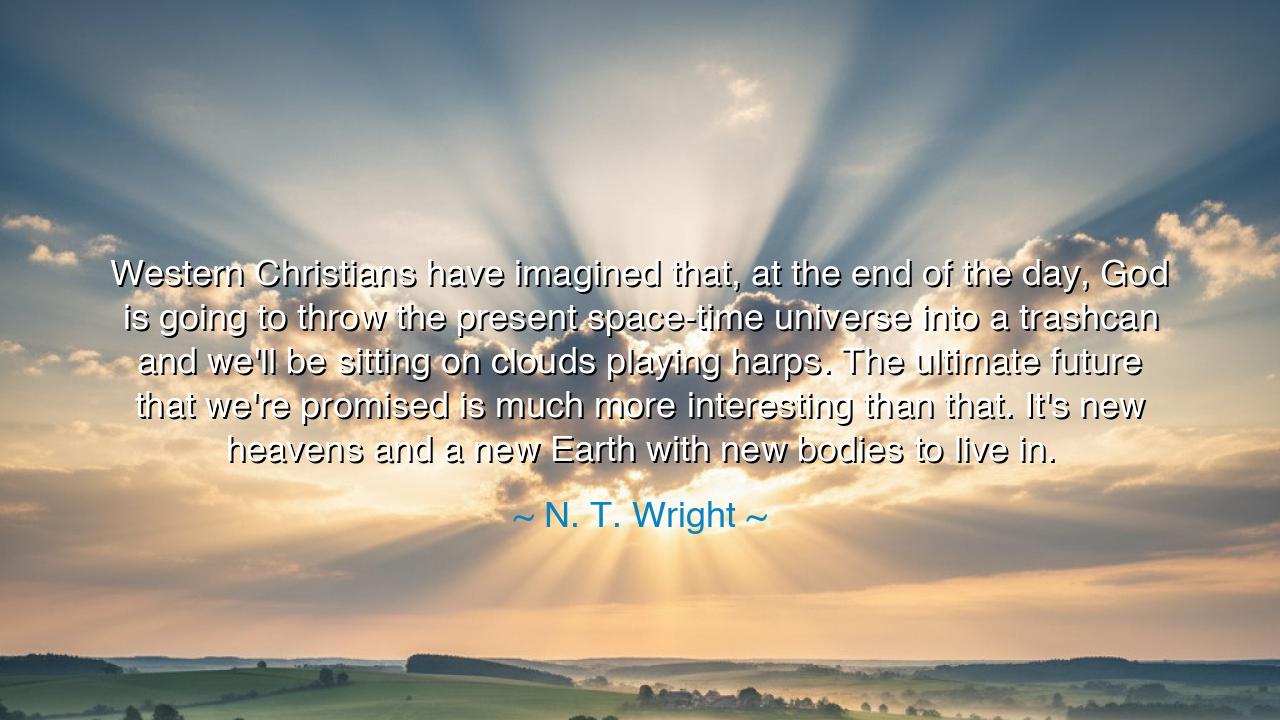
Western Christians have imagined that, at the end of the day, God
Western Christians have imagined that, at the end of the day, God is going to throw the present space-time universe into a trashcan and we'll be sitting on clouds playing harps. The ultimate future that we're promised is much more interesting than that. It's new heavens and a new Earth with new bodies to live in.






Hear, O Seekers of Wisdom, for the words of N. T. Wright speak to the heart of one of humanity’s greatest longings—the desire to understand the future and the ultimate fate of our existence. He said, "Western Christians have imagined that, at the end of the day, God is going to throw the present space-time universe into a trashcan and we'll be sitting on clouds playing harps. The ultimate future that we're promised is much more interesting than that. It's new heavens and a new Earth with new bodies to live in." These words challenge a deeply ingrained vision of the afterlife, one that is often portrayed as passive, ethereal, and disconnected from the world we know, and instead offer a vision that is vibrant, embodied, and redemptive.
To understand the weight of Wright's words, we must first examine the common image that many have held for centuries—the image of a heaven far removed from this world, a place where souls float aimlessly on clouds, strumming harps in eternal peace. This vision of the future is often depicted as the ultimate reward, the final destination where all suffering and struggle are left behind. But Wright challenges this simplistic view, for it speaks of an afterlife that denies the very real and tangible nature of the world we inhabit. This vision does not capture the fullness of human existence, nor the fullness of God’s plan.
In the ancient world, philosophers like Plato spoke of an ideal world beyond the material, a world of perfect forms where the soul might find its true home. But even in his musings, there was an understanding that the physical world was not to be discarded, but transformed. Wright draws upon this ancient tension between the material and the spiritual, but he goes further, proposing a new vision—a new heavens and a new Earth. This new creation is not a distant, abstract place, but one that is deeply connected to our current reality, filled with promise and possibility. It is not a realm to escape to, but a future that redeems and restores the very world we inhabit.
The vision Wright presents is not one of disposal but of restoration. Just as a master craftsman may take a broken piece of wood or a ruined work of art and, with skill and care, breathe new life into it, so too will God restore the universe to its rightful state. Wright calls this the promise of a new body, a new Earth, and a new heavens—a world where the imperfections and pains of our current existence are transformed and made right. This is not a promise of a passive existence but of active participation in a world that is made whole. God is not discarding creation; He is redeeming it, bringing it to its fullest potential.
Consider, O Seekers, the example of the phoenix, that mythical bird which, when consumed by flames, is reborn from its own ashes. The vision of the future that Wright describes is akin to this sacred cycle of death and rebirth. The universe, much like the phoenix, is not to be discarded but renewed, transformed, and set ablaze with life and beauty once more. In this new creation, there is no separation between the physical and the spiritual. The heavens and the Earth are united, and we, in our new bodies, will walk upon a restored Earth—not as passive souls, but as active participants in a redeemed world.
The lesson of Wright is one of hope, of expectation, and of transformation. We are not bound to a distant, disembodied existence where we escape the world we know. No, we are called to embrace the future—a future that is tangible, vibrant, and deeply rooted in the creation we know and love. It is a vision of restoration, not abandonment; a promise that the future is not to be feared or rejected, but celebrated and prepared for. Wright reminds us that God's plan for the future is not one of escapism, but of redemption and renewal.
So, O Seekers, let us live in anticipation of this future. Let us not resign ourselves to the false notions of a distant heaven but look forward to the new Earth that awaits us. In our own lives, let us seek to bring about a taste of that future now, living lives of restoration, creativity, and hope. Just as the phoenix rises from the ashes, so too can we rise from the struggles of today, knowing that the future is not a place of escape, but a place of redemption and transformation. Embrace the new creation that is to come, and in doing so, find the fullness of life that God has promised.






AAdministratorAdministrator
Welcome, honored guests. Please leave a comment, we will respond soon